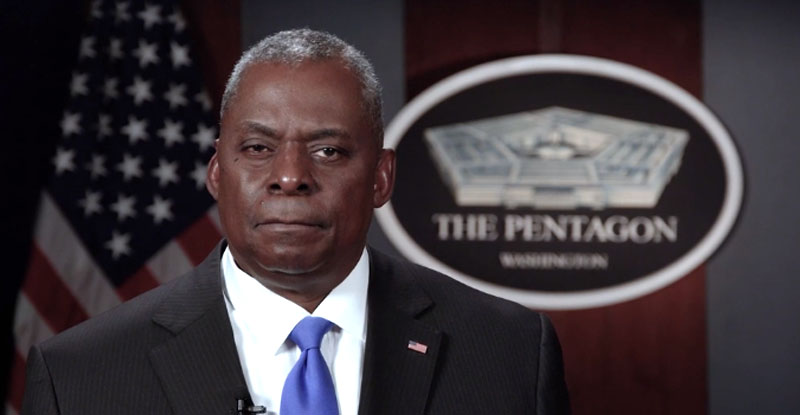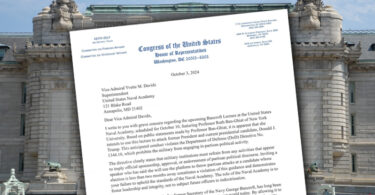By M. Oakland, attorney
On Aug. 14, 2021, Secretary of Defense Lloyd Austin, after months of build-up, mandated that all service members receive one of the available Covid-19 shots. Those who would not comply were to be separated (that is, discharged) from service. Essentially, they would be fired.
The Department of Defense (DOD) has been dealing with the disastrous consequences of that mandate ever since.
Many within the services saw this as a political move — a purging of undesirable opponents from the ranks. The services were flooded with a torrent of exemption requests they were not equipped to handle.
Backlogs started immediately, with many exemption requests taking a year or longer to be acted upon. Many exemption requests never got decided at all. When the services went forward with separations, they found themselves facing litigation — litigation that was not going well.
A group of SEALs claimed the Navy was not seriously considering their religious objections to the vaccine requirement. The Fifth Circuit agreed and prevented the Navy from disciplining or discharging the SEALs, noting that the Navy had not approved a single religious exemption to any vaccine in more than seven years.
The administration won a partial victory at the Supreme Court when they regained the right, pending further litigation, to consider vaccination status in deployment or assignment decisions.
In a separate case, when one Navy commander won a temporary injunction against the mandate, the service chose to sideline the destroyer he commanded rather than deploy the ship with him in an unvaccinated status.
Some cases went better for the administration. A federal court in Colorado denied two service members’ attempts to halt vaccinations throughout the DOD.
Overall, the litigation dragged on, generating continual headlines pitting service members against the services.
The situation continued in this untenable, unresolved state until Congress stepped in to end it.
In December 2022, as part of a political compromise, Congress passed the National Defense Authorization Act and ordered Austin to stand down. Specifically, the act required:
Not later than 30 days after the date of the enactment of this Act, the Secretary of Defense shall rescind the mandate that members of the Armed Forces be vaccinated against COVID-19 pursuant to the memorandum dated August 24, 2021.
Since the U.S. military is supposed to be wholly subservient to the civilian government, Austin obeyed — kind of.
In a memorandum on Jan. 10, 2023, Austin stated: “No individuals currently serving in the Armed Forces shall be separated solely on the basis of their refusal to receive the COVID-19 vaccination if they sought an accommodation on religious, administrative, or medical grounds” (emphasis added).
Do you see the difference? Congress ordered Austin to end the mandate. Austin agreed to end the mandate, but only for those who had requested an official exemption.
Service Members Left Behind
When the original mandate was first announced, service members who objected to the vaccine did so on a number of grounds. Some had a medical condition, such as pregnancy, and sought a medical exemption. Some did not want to take the vaccine for religious reasons and sought a religious exemption.
But there were some service members who simply did not want to subject their bodies to experimental medicine to protect against a disease that posed so little risk to healthy 20- to 35-year-olds (i.e., the vast majority of the service members affected). Covid-19 was not going to hurt them, but nobody knew the long-term effects of a brand-new vaccine.
Many of these soldiers ended up putting in a religious exemption request. Some of them likely did not have a religious reason for their request but saw a sudden conversion or change of heart as a way to get around the DOD’s requirements. Anybody in the above categories is now in the clear.
The remaining service members are those who did not agree with the vaccine mandate but had too much integrity to put forth a religious exemption request that they knew in their hearts would be dishonest.
These service members saw the threatened punishment and were willing to take it. But Congress’s broad decision to rescind the mandate should have ended their ordeal.
Yet these are the ones Austin has selected for particular punishment.
So where are these soldiers now?
They cannot be discharged. Congress has made that clear. But they also cannot go unpunished.
Because Austin limited his rescission to service members who sought an exemption, the secretary’s original 2021 mandate still applies to them. As long as they continue to be unvaccinated, they are considered to be disobeying a lawful order. The result is a cruel limbo.
Each service deals with the embarrassment differently, but consider an officer in the Army.
Since the original mandate in 2021, these soldiers have been under a suspension of favorable action, commonly referred to as a “flag.” The Army, following Austin’s lead, only removed the flags of soldiers who had requested and been denied an exemption.
The remaining flags cannot be resolved until the soldiers are either separated from the Army or a decision is made to retain them in the Army. Neither outcome has occurred over the last six months, and, as their cases fade from the headlines, no outcome is expected either. Making a decision would require political courage. It would be better if the problem just went away.
Since these soldiers are flagged, they are not allowed to get promoted or get an award even if they have earned it.
They are not allowed to go to certain schools and improve their skills. They are not allowed to change duty stations.
Some of these service members (and their families) are sitting in overseas locations — where our Army sent them to serve this nation — and have to just sit there, waiting out the time until their contract expires. That could be years in the future.
Lessons Learned
It is hard not to pity the heads of the Armed Services. They tried to issue an order that was not only wholly unnecessary but also politically repugnant to many within their organizations.
It is difficult enough to manage a bureaucracy of more than 2 million active-duty and reserve component service members. There was no realistic way to apply an individual examination to the tens of thousands of exemption requests that soldiers, sailors, airmen, and Marines sent up their chains of command.
The first lesson here is that in a democracy that depends on volunteers to fight and win its wars, DOD leaders should not issue orders without the political capital to enforce them.
Another lesson: Leave the politics to the politicians. The military’s ironclad obedience to civil officials is a cornerstone of our democracy. The DOD should go out of its way to avoid undermining the civil government.
Abortion Politics
This is not the only time the secretary has tried to put his own political spin on the department’s operations.
After the Supreme Court’s decision in Dobbs v. Jackson Women’s Health Organization, Austin ordered the DOD to, among other things, provide time off and pay for certain expenses of service members who want to travel to another state to attain an abortion.
In addition to being an unusually political move, this policy seems contrary to 10 U.S. Code § 1093, which prevents the DOD from using funds for any abortion except in cases of rape, incest, or a danger to the mother’s life.
Sen. Tommy Tuberville, R-Ala., objecting to the DOD’s political turn, has put a hold on all general officer-level nominations before the Senate Armed Service Committee. Rather than approving nominations in batches, the senator’s hold requires the committee to hold hearings on each and every officer. The result has been a backlog of more than 200 officers who cannot be promoted and cannot take command.
The victims of Austin’s Covid policy will not generate the headlines that his abortion policy does. They do not wear stars on their chests and they do not often get to testify before Congress.
But we should not allow the secretary of defense’s pride to keep these brave men and women in suspense.
He must end the vaccine requirement for all service members and demand that the services restore them to full status.
Congress already made the decision to end his mandate. It is time he follows orders.








Leave a Comment